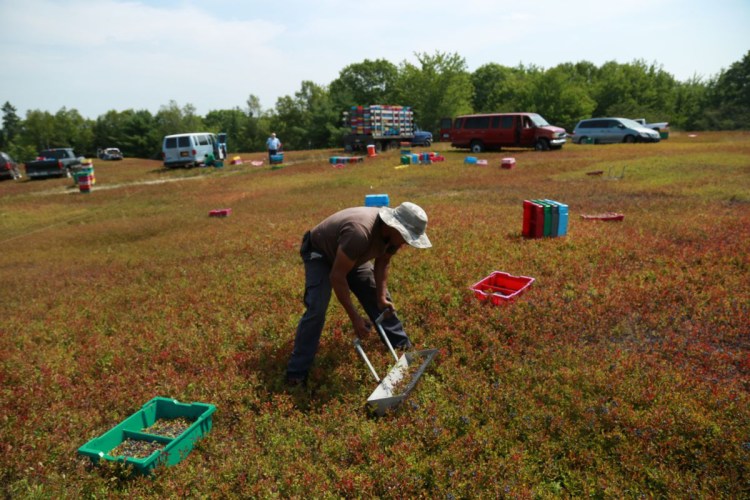ELLSWORTH — Even in a good year, farming is an exercise in uncertainty, with farmers at the whim of markets, yields and weather. In a pandemic, growers have to add another worry to the list: Will my workers arrive?
“We don’t have a Plan B,” said Simeon Allen of Allen’s Wild Maine Blueberries. “If we can’t get workers here, we won’t be able to harvest.”
Migrant workers who “follow the crop,” moving from one state to another as the season changes, make up just 5 percent of the hired farm workforce, according to the U.S. Department of Agriculture. But they play an outsize role in food production in seasonal states like Maine, where roughly 18 percent of hired farm labor was made up of migrant workers as of 2012, according to the Maine Department of Labor, a number that has been steadily rising in recent years.
Between 30 and 40 percent of the Allen’s blueberry crop is harvested by hand-rakers over four weeks beginning in August, said Allen.
“We usually bring in about 40 migrant workers, here on work visas; they travel up and down the Eastern Seaboard, starting with crops in Florida,” Allen said.
Allen said a “good majority” of the workers hired by the company are U.S. citizens, while some of the group are in the states on H-2A visas, temporary work visas that allow employers to fill a pre-approved number of positions after proving they are unable to fill them locally.
Those visa applications are typically processed in the first week of April by U.S. consular offices, but with those offices largely shut down because of the coronavirus pandemic, application interviews and other aspects of the process have been delayed.
It’s unclear, for example, whether visas for the 20 workers requested by Cherryfield Foods will be processed in time for their June arrival, said Jorge Acero, director of labor outreach and education for the Maine Department of Labor.
Even some workers who are already in the United States have been stalled. Jeff Beardsworth, who runs Homewood Farm in Blue Hill with his wife, said many of his workers who had been due to arrive in mid-April were in Florida, unable to cross the border into Georgia due to restrictions.
“They’re just stuck,” said Beardsworth, adding that all of them are U.S. citizens who were heading up to help with the strawberry crop. “I’m going to try to run a farm by myself for a while.”
Allen said he’s also heard of workers who would normally head north this time of year stuck in the South. But both men are hoping things will be more normalized by late summer.
“When the blueberries come, we hope things will change,” said Beardsworth. “Right now, it’s strawberries, and they’ve got to be uncovered.” Beardsworth said he’s also unsure whether the local students who help in the summer will be allowed by their families to come work. “I don’t know if families are going to let them out of the house.”
Acero said some farmworkers might also be adhering to recommendations to shelter in place, but that in their absence, Maine farm families are taking on the extra work themselves.
“The families are working extra hard getting the grounds ready and prepping the field,” Acero said.
Although there has been some concern among Mainers about seasonal residents arriving from out of state, Acero said only two farmers have expressed such concerns about migrant workers.
“More than anything, they just want the workers to arrive, no matter what,” he said.
Allen said the company plans to implement “some social distancing and sanitary procedures and requirements for our workers.”
But many farms are simply not set up to allow individuals to remain at least 6 feet apart. Migrant workers stay in bunkhouses where two to three people share a room, and in larger dormitories where many more people share a larger space. Farmers are being asked to reconfigure them, but that’s not a viable option in most cases, especially with such short notice.
“It’s not possible,” Acero said. “Their bunkhouses are fixed in such a way that there’s no way to separate them.”
The Maine Center for Disease Control and Prevention has been closely tracking outbreaks of COVID-19 in congregate living settings, such as long-term care facilities and shelters, where the disease can be particularly difficult to contain. Outbreaks have forced several food processing plants around the nation, including pork processing plants in Iowa and South Dakota, to close after workers fell ill.
Acero asked that farmers understand that migrant workers may need care should one or more of them become ill.
“Please don’t tell the worker they’ve got to leave,” he said.
Farmers with payroll are eligible for the federal Paycheck Protection Program to help cover payroll costs and some may also be eligible for unemployment under the new rules in the CARES (Coronavirus Aid, Relief, and Economic Security) Act. Mano en Mano, which advocates for farmworkers out of its offices in Milbridge, has also established the Estamos Aquí Fund to support immigrants and farmworkers in Maine with financial challenges associated with COVID-19, especially those who may not be eligible for government assistance.
Send questions/comments to the editors.



Success. Please wait for the page to reload. If the page does not reload within 5 seconds, please refresh the page.
Enter your email and password to access comments.
Hi, to comment on stories you must . This profile is in addition to your subscription and website login.
Already have a commenting profile? .
Invalid username/password.
Please check your email to confirm and complete your registration.
Only subscribers are eligible to post comments. Please subscribe or login first for digital access. Here’s why.
Use the form below to reset your password. When you've submitted your account email, we will send an email with a reset code.